Blinken China's trip likely to bring only temporary relief for tensions

U.S. Secretary of State Antony Blinken meets with Chinese President Xi Jinping in the Great Hall of the People in Beijing, China, June 19, 2023. REUTERS/Leah Millis/Pool/File Photo Purchase Licensing Rights
WASHINGTON/BEIJING, June 20 (Reuters) - The first trip to China by a U.S. secretary of state in five years may have eased tensions that many saw escalating to dangerous levels, but the lack of progress on core issues means the relief will likely only be temporary.
The limited achievements of Antony Blinken's two days of talks in Beijing were underscored on Tuesday when Washington again called for Beijing to reopen military communication channels and Blinken signaled concern about reports that China plans a military training facility in Cuba, an island 100 miles (160 km) south of the U.S. state of Florida.
At one of the most significant U.S.-China exchanges since U.S. President Joe Biden took office, Blinken and Xi met on Monday. The two sides appeared entrenched over issues from Taiwan to trade - including U.S. actions toward China's chip industry - plus human rights and Russia's war against Ukraine.
China and the U.S. did commit to keep talking, with further high-level visits expected in coming months, including possible trips to China by Treasury Secretary Janet Yellen and Commerce Secretary Gina Raimondo and a visit to Washington by Chinese Foreign Minister Qin Gang.
Those exchanges could clear the way for meetings between U.S. President Joe Biden and China's President Xi Jinping at the September G20 meeting in India and the November APEC summit in San Francisco.
Both Xi and Biden said progress had been made with Blinken's visit, but few observers are optimistic that even higher-level interactions will alter the course of the U.S.-China relationship, or calm fears that the two could one day find themselves in conflict over the Chinese-claimed island of Taiwan.
"The fundamentals of the U.S.-China relationship remain as bad as they’ve been in decades," said Benjamin Herscovitch, a research fellow at the Australian National University.
"No amount of high-level discussion is likely to overcome the deepening distrust on both sides of the Pacific," he said, adding that the prospects for bilateral ties was likely to get gloomier ahead of the 2024 U.S. presidential campaign during which the debate about China policy was likely to feature prominently.
A SEAT AT THE TABLE?
Blinken's hosts did not appear eager to convey warmth toward the United States.
In the meeting between Xi and Blinken, China's president sat at the head of the table with the America's top diplomat off to the side, a departure from precedent that sparked speculation in Chinese social media and among China watchers of a possible snub.
Previous U.S. secretaries of state visiting Beijing, going back at least two decades and including Donald Trump's secretary of state Mike Pompeo, have sat side-by-side with the president, in cream white armchairs, or on opposite sides of the table.
Just days earlier, Xi had welcomed another American, Microsoft co-founder Bill Gates, and sat side-by-side with him, calling him an "old friend."
Jacob Stokes, a senior fellow at the Center for a New American Security argued against taking too negative a view of the meetings, saying that simply by meeting Blinken, Xi signaled that China is invested in improving relations with the U.S.
"Beijing clearly seeks to engage, even when they say otherwise publicly," said Stokes. "If Xi wanted to tank the process, he would have skipped the meeting with Blinken."
China has reasons to push for better relations.
The world's second biggest economy is struggling with flagging consumer demand, raising the pressure to seek improved trade ties with major western economies, and China leaders see a need to reassure its neighbors that it can manage the contentious U.S. relationship.
John Delury, professor of Chinese studies at South Korea’s Yonsei University, said Xi's meeting with Blinken appeared to be message to the world "to want to appear to be committed to a good relationship with the United States."
"I think there's an awareness of that's what the world wants, that’s what the region wants. Obviously, the big question is, how long does this stick?"
Yang Tao, director-general for North American and Oceanian affairs at the Chinese foreign ministry, was blunt in portraying Blinken's trip - which the U.S. diplomat originally had planned to make in February but postponed after a suspected Chinese spy balloon flew over the United States - as a victory for China.
Yang said it was made possible after the U.S. side repeatedly said it wanted to look forward and turn the page of tense relations aggravated by the balloon incident and Taiwanese leader Tsai Ing-wen's transit in the United States in April.
"The U.S. obviously blinked first in this round of strategic confrontation," he said in a commentary posted on Tuesday on the official WeChat account of the Chinese embassy in France.
Sign up here.
Reporting by David Brunnstrom, Yew Lun Tian and Martin Quin Pollard; Additional reporting by Humeyra Pamuk Editing by Don Durfee and Alistair Bell
Our Standards: The Thomson Reuters Trust Principles.
